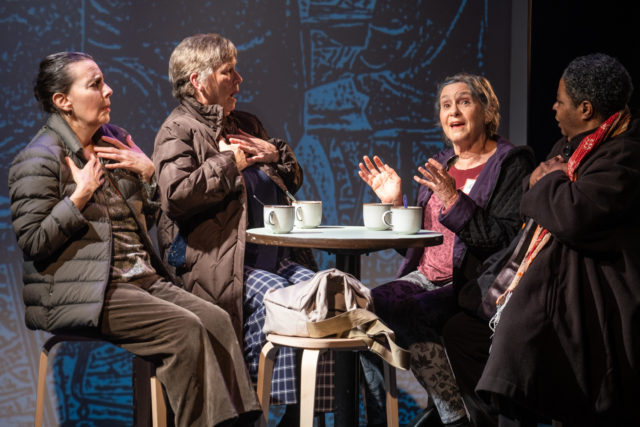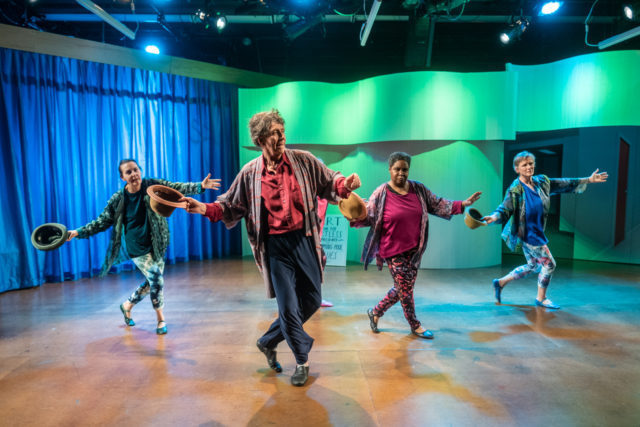
A quartet of senior women gets more than they bargained for in Lemon Girls or Art for Artless (photo by Andrew Bisdale)
LEMON GIRLS OR ART FOR THE ARTLESS
La MaMa Experimental Theatre Club, the Downstairs
66 East Fourth St. between Second Ave. & Bowery
Thursday – Sunday through March 27, $25-$30
212-475-7710
www.lamama.org
talkingband.org
Lemon Girls or Art for the Artless is a small show in a small space, but it’s one of the most exhilarating and inspiring shows I’ve seen since the pandemic interrupted in-person entertainment in March 2020. It’s an uproarious and touching celebration of aging and coming to terms with who you are and what you’ve accomplished, a kind of alternative to the wickedly fun Six on Broadway, where the six wives of Henry VIII battle it out to see who had it worst with the monarch.
Continuing in the Downstairs theater at La MaMa through March 27, Lemon Girls is about four senior women whose connection to life changes when they meet a stranger in their local café, appropriately called Solo, where the quartet, friends since attending the progressive Lemon Elementary school together, meet for coffee every Tuesday at 3:30. They sit at the same table each week, but they are surprised one afternoon to not only find a line to get in — the new pencil latte has become a thing — but also see that a stranger has taken their spot.
Urban historian Nivea (Patrena Murray), social worker Topo (Lizzie Olesker), retired civil servant Pinny (Louise Smith), and cookbook writer Lorca (Ellen Maddow) assume that the man, Sid Spitz (Jack Wetherall), will cede them the table, but instead he cheekily asks them to join him, in some ways becoming their fifth friend, painter Fran (Tina Shepard), who is not there. They recognize instantly that he’s not like the other males they know, who call themselves the Romeos: Retired Old Men Eating Out. (“They enjoy the turkey chili. It gives them gas,” Pinny points out.) An FIT librarian and performance artist, Sid invites the women to become part of a music theater workshop he leads in the basement of a rec center.
After some waffling, they do actually show up. Their skepticism of Sid’s earnest direction gives the rehearsal scenes brilliant, low-key comedy. “Keep on walking, fill in the spaces, curve through the people, use your arms. And STOP. And float. And STOP and float,” he advises, adding, “The floor is sand, your feet are hands, they squeeze the sand. They caress, they sink, they caress, they squeeze.”
Lorca says to Nivea, “What does he mean our feet are hands? Like monkeys? Does he mean monkeys? Is this the beach? Are we supposed to be at the beach, or the zoo?”
When Sid tells them to move underwater and “fill the empty spaces,” Lorca wonders, “Underwater? How do we breathe? People can’t breathe underwater.” And when he prompts them to glide like their hands are knives and the air is bread, slicing away, Lorca argues, “Suddenly it’s the kitchen?”

Sid Spitz (Jack Wetherall) leads rehearsals for upcoming show in charmer at La MaMa (photo by Andrew Bisdale)
But the four women are superb actors, able to play their characters, older women who are learning to perform, with skill and nuance as the quartet eventually enjoys adapting to Sid’s unique choreographic methods and come up with songs that share intimate details of their lives. As they prepare to put on a public show for an organization called Art for the Artless, there’s conflict: In order to keep the workshop funded, they need a fifth participant, and Nivea promises to bring Fran.
In addition, Sid needs to get paid so he can afford his rent to his landlord and best friend, Marvin; the unseen Marvin is about to turn ninety and is close with artist David Hockney, which excites the group, who rave about how Hockney’s recent show at the Met changed their lives.
At one point, Topo opines, “What I think I look like and what I look like don’t match. That gives me the creeps,” to which Lorca replies, “But it doesn’t matter. It doesn’t matter anymore.” Before the rehearsals, the women had resigned themselves to a plain existence, exemplified by some of Lorca’s bitter songs. Sitting outside the café, Lorca and Pinny remember one of Lorca’s schoolgirl ditties: “I sit on a bee because I am dumb / I scream at my teacher cuz she isn’t fair / I kick the doctor because he hurt me / I drown in the river because it is there.” But hope is on the way.
Lemon Girls or Art for the Artless is the latest from avant-garde mainstays Talking Band, which has staged more than fifty new works since 1974. The show is directed by four-time Obie winner Paul Zimet (The City of No Illusions, The Walk Across America for Mother Earth), who cofounded the troupe with Maddow (Fusiform Gyrus — A Septet for Two Scientists and Five Horns, Fat Skirt Big Nozzle), who wrote Lemon Girls and composed the wonderful songs, and Shepard. Sean Donovan (Cabin, The Reception) did the marvelous, often hysterical choreography, which is a character unto itself, helping define the four women and how they view the world. The fab costumes are by Kiki Smith.
Anna Kiraly’s set is anchored by the slightly raised Café Solo at the corner of stage right, covered by a blue curtain when the action is taking place in the central makeshift workshop space, where a door leads beyond. The characters open and close the curtain as scenes there begin and end; on the back wall of the café, Kiraly projects pixelated, abstracted black-and-white footage of younger people hanging out in the shop, which the four women ignore.
As we emerge from the coronavirus crisis, which hit senior citizens particularly hard, it is an absolute joy to watch Nivea, Topo, Pinny, Lorca, and Sid, portrayed by a supremely talented cast, meeting new people, trying new things, and finding renewed meaning in their everyday existence.
“That’s what’s changed!” Nivea suddenly declares. “That’s what I’ve gone back to, I mean. I’ve stopped watching myself. I used to always be watching myself watching myself. Did you ever do that?”
Lorca replies, “Oh yeah. Everything was such a ridiculous complication of layers. And finally I just got tired of it, really, really tired of it. I would watch myself reflected in store windows looking like a hobbling old hag. It was so sad and exhausting! So I just stopped looking. It’s like I went back to when I was eight or something. Whatever I feel like doing, I do it.”
Talking Band has been around for nearly a half century; if you haven’t seen them before, you’ll be thrilled that you’ve met them now and have finally been introduced to their intoxicating philosophy.